- I nfographics
- Show AWL words
- Subscribe to newsletter
- What is academic writing?
- Academic Style
- What is the writing process?
- Understanding the title
- Brainstorming
- Researching
- First draft
- Proofreading
- Report writing
- Compare & contrast
- Cause & effect
- Problem-solution
- Classification
- Essay structure
- Introduction
- Literature review
- Book review
- Research proposal
- Thesis/dissertation
- What is cohesion?
- Cohesion vs coherence
- Transition signals
- What are references?
- In-text citations
- Reference sections
- Reporting verbs
- Band descriptors
Show AWL words on this page.
Levels 1-5: grey Levels 6-10: orange
Show sorted lists of these words.
Any words you don't know? Look them up in the website's built-in dictionary .
Choose a dictionary . Wordnet OPTED both

Writing objectively How and when to use an impersonal tone
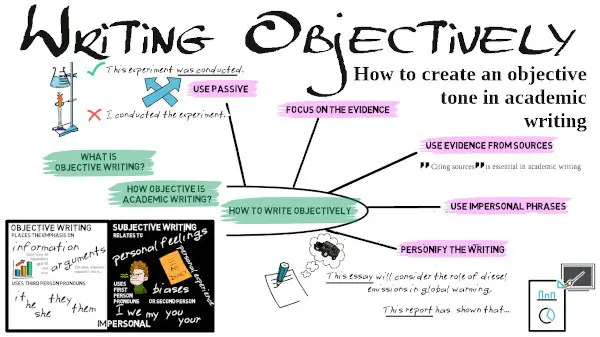
For another look at the same content, check out the video on YouTube (also available on Youku ). There is a worksheet (with answers and teacher's notes) for this video.
Academic writing is generally impersonal and objective in tone. This section considers what objective writing is , how objective academic writing is , then presents several ways to make your writing more objective . There is also an academic article , to show authentic examples of objective language, and a checklist at the end, that you can use to check the objectivity of your own writing.
What is objective writing?
Objective writing places the emphasis on facts, information and arguments, and can be contrasted with subjective writing which relates to personal feelings and biases. Objective writing uses third person pronouns (it, he, she, they), in contrast to subjective writing which uses first person pronouns (I, we) or second person pronoun (you).
How objective is academic writing?
Although many academic writers believe that objectivity is an essential feature of academic writing, conventions are changing and how much this is true depends on the subject of study. An objective, impersonal tone remains essential in the natural sciences (chemistry, biology, physics), which deal with quantitative (i.e. numerical) methods and data. In such subjects, the research is written from the perspective of an impartial observer, who has no emotional connection to the research. Use of a more subjective tone is increasingly acceptable in areas such as naturalist research, business, management, literary studies, theology and philosophical writing, which tend to make greater use of qualitative rather than quantitative data. Reflective writing is increasingly used on university courses and is highly subjective in nature.
How to write objectively
There are many aspects of writing which contribute to an objective tone. The following are some of the main ones.
Use passive
Objective tone is most often connected with the use of passive, which removes the actor from the sentence. For example:
- The experiment was conducted.
- I conducted the experiment.
- The length of the string was measured using a ruler.
- I measured the length of the string with a ruler.
Most academic writers agree that passive should not be overused, and it is generally preferrable for writing to use the active instead, though this is not always possible if the tone is to remain impersonal without use of I or other pronouns. There is, however, a special group of verbs in English called ergative verbs , which are used in the active voice without the actor of the sentence. Examples are dissolve, increase, decrease, lower, and start . For example:
- The white powder dissolved in the liquid.
- I dissolved the white powder in the liquid.
- The white powder was dissolved in the liquid.
- The tax rate increased in 2010.
- We increased the tax rate in 2010.
- The tax rate was increased in 2010.
- The building work started six months ago.
- The workers started the building work six months ago.
- The building work was started six months ago.
Focus on the evidence
Another way to use active voice while remaining objective is to focus on the evidence, and make this the subject of the sentence. For example:
- The findings show...
- The data illustrate...
- The graph displays...
- The literature indicates...
Use evidence from sources
Evidence from sources is a common feature of objective academic writing. This generally uses the third person active. For example:
- Newbold (2021) shows that... He further demonstrates the relationship between...
- Greene and Atwood (2013) suggest that...
Use impersonal constructions
Impersonal constructions with It and There are common ways to write objectively. These structures are often used with hedges (to soften the information) and boosters (to strengthen it) . This kind of language allows the writer to show how strongly they feel about the information, without using emotive language, which should be avoided in academic writing.
- It is clear that... (booster)
- It appears that... (hedge)
- I believe that...
- There are three reasons for this.
- I have identified three reasons for this.
- There are several disadvantages of this approach.
- This is a terrible idea.
Personify the writing
Another way to write objectively is to personify the writing (essay, report, etc.) and make this the subject of the sentence.
- This essay considers the role of diesel emissions in global warming.
- I will discuss the role of diesel emissions in global warming.
- This report has shown that...
- I have shown that...
In short, objective writing means focusing on the information and evidence. While it remains a common feature of academic writing, especially in natural sciences, a subjective tone is increasingly acceptable in fields which make use of qualitative data, as well as in reflective writing. Objectivity in writing can be achieved by:
- using passive;
- focusing on the evidence ( The findings show... );
- referring to sources ( Newbold (2021) shows... );
- using impersonal constructions with It and There ;
- using hedges and boosters to show strength of feeling, rather than emotive language;
- personifying the writing ( This report shows... ).
Bailey, S. (2000). Academic Writing. Abingdon: RoutledgeFalmer
Bennett, K. (2009) 'English academic style manuals: A survey', Journal of English for Academic Purposes , 8 (2009) 43-54.
Cottrell, S. (2013). The Study Skills Handbook (4th ed.) , Basingstoke: Palgrave MacMillan.
Hinkel, E. (2004). Teaching Academic ESL Writing: Practical Techniques in Vocabulary and Grammar . Mahwah: Lawrence Erlbaum Associates Inc Publishers.
Hyland, K. (2006) English for Academic Purposes: An advanced resource book . Abingdon: Routledge.
Jordan, R. R. (1997) English for academic purposes: A guide and resource book for teachers . Cambridge: Cambridge University Press.
Example article
Below is an authentic academic article. It has been abbreviated by using the abstract and extracts from the article; however, the language is unchanged from the original. Click on the different areas (in the shaded boxes) to highlight the different objective features.
Title: Obesity bias and stigma, attitudes and beliefs among entry-level physiotherapy students in the Republic of Ireland: a cross sectional study. Source: : https://www.sciencedirect.com/science/article/pii/S0031940621000353

GET FREE EBOOK
Like the website? Try the books. Enter your email to receive a free sample from Academic Writing Genres .
Below is a checklist for using objectivity in academic writing. Use it to check your writing, or as a peer to help. Note: you do not need to use all the ways given here.
Next section
Read more about writing critically in the next section.
- Critical writing
Previous section
Go back to the previous section about using complex grammar .
- Complex grammar

Author: Sheldon Smith ‖ Last modified: 05 February 2024.
Sheldon Smith is the founder and editor of EAPFoundation.com. He has been teaching English for Academic Purposes since 2004. Find out more about him in the about section and connect with him on Twitter , Facebook and LinkedIn .
Compare & contrast essays examine the similarities of two or more objects, and the differences.
Cause & effect essays consider the reasons (or causes) for something, then discuss the results (or effects).
Discussion essays require you to examine both sides of a situation and to conclude by saying which side you favour.
Problem-solution essays are a sub-type of SPSE essays (Situation, Problem, Solution, Evaluation).
Transition signals are useful in achieving good cohesion and coherence in your writing.
Reporting verbs are used to link your in-text citations to the information cited.
Subjective vs. Objective Essay: Examples, Writing Guides, & Topics
Subjective or objective essay writing is a common task students have to deal with. On the initial stage of completing the assignment, you should learn how to differentiate these two types of papers. Their goals, methods, as well as language, tone, and voice, are different.
Our specialists will write a custom essay specially for you!
A subjective essay focuses on the writer’s personal opinion, while an objective one represents valid facts. So, be careful when composing an objective paragraph or paper. Don’t let your beliefs take over real arguments supported by substantial evidence.
In short, differences between these styles concern the following:
- The ground for objective essays is facts; for subjective essays – personal opinions and beliefs.
- Objective papers report the findings from scientific sources, while subjective ones describe the writer’s thoughts.
- The objective essay’s goal is to help the reader make a decision. Subjective writing aims to reflect the author’s vision of the issue.
So, if you face this task for the first time, you may need some explanations. Custom-writing.org experts prepared a list of tips on how to write objective and subjective essays. Some topics, as well as objective and subjective writing examples, will also be useful.
- 🆚 Subjective vs. Objective
🔗 References
🆚 subjective vs. objective essays.
First and foremost, let’s find out the critical differences between the writing styles. Take a look at the following table and shed light on this issue.
An objective essay is a presentation of the material with no independent opinion involved. Only facts matter in this paper, and only facts can back up some assertions. Writing subjective essays implies introducing your standpoint on a particular problem.
Just in 1 hour! We will write you a plagiarism-free paper in hardly more than 1 hour
📋 How to Write an Objective Essay
Writing any essay consists of three parts: preparation, the actual writing, and revision. During the first one, you need to decide on your topic and do a little research. You can see how it looks in a real example.
Objective Essay Example: The Portrayal of Odysseus
In Odyssey, Homer portrays Odysseus, the king of Ithaca, as the true epic hero. The depiction of Odysseus is thoughtfully knitted together with the themes of love and loyalty that further magnify it, painting a holistic picture of a long 10-year journey home. Although it can be argued that some of Odysseus’s personality traits he displays cannot be applied to a true hero, he is still depicted following a very specific heroic archetype.
Now, let’s get into more detail!
Objective Essay Topics
If you’ve decided to write an objective essay, you need to come up with a topic. The topic gives a reader a brief overview of what will be covered in the paper.
Here are ten great examples:
- While the differences between Italy and Spain are evident, the resemblances are striking.
- There are several similarities between the movies “Deep Impact” and “Armageddon.”
- Compare and contrast the capitals of two English-speaking countries.
- Somatic symptoms in people with PTSD can be influenced by age, gender, and avoidance.
- Some might argue, but being overweight carries a social stigma.
- Environmental factors contribute to the phenotypic expression of psychological disorders.
- Although the exact reason remains unclear, depression is affected by sex, gender, hormonal changes, and age.
- When comparing and contrasting the Bible and Quran, it seems that they have more similarities than differences.
- Musical ability is the result of influence on the person from outside.
- In comparison to extroverts, introverts draw power from within themselves to use it in future activities.
Objective Essay Structure
We shall continue with exploring an essay structure. Note that the parts described below are essential for any essay.
Receive a plagiarism-free paper tailored to your instructions. Cut 20% off your first order!
- Introduction . The introduction is usually the part that broadly describes the topic and gets the interest of the reader. This part of the paper should cover some background information and present the purpose.
- Hypothesis . In case your essay has one, state it in your introduction. A hypothesis includes information about how you intend to prove or refute the claim. It briefly describes the way you intend to do so.
- Arguments . Present one side of the argument. In the next paragraph, present the opposing one, using such words as “however,” “nevertheless,” and “although.” The task is to provide the readers with two sides of the argument.
- Evidence . Provide the evidence for all of your points. Keep the balance in providing proof and refutal. Omit your personal opinion, rather than include the evidence you find informative and convincing.
- Conclusion . Summarize the arguments both for and against the position. While remaining objective, shortly go over the information you presented as evidence. If the instructions require a personal opinion, in conclusion, you might write one. In other cases, briefly recap the parts of the essay. Shorten sentence generator would be greatly beneficial in such endeavor.
📜 How to Write a Subjective Essay
As we’ve mentioned earlier, a subjective essay represents the author’s vision of a particular issue. You have an opportunity to introduce your point of view without supporting your ideas with evidence from the primary sources. However, make sure your arguments are still logical and adequate.
Now see how to write a subjective essay in the sections below.
Subjective Writing Example
A well-chosen topic is the vital determinant of a successful essay. Yet, the process of selecting an idea for your paper might be challenging. That’s why you may find our example helpful.
The rapid pace of development of modern technologies increases the demand for oil and gas every year. A considerable amount of these resources is necessary to maintain both industrial enterprises and private equipment. Despite active production, there are still many unexplored places on Earth, potentially rich in oil and gas deposits. However, while making them public would help solve the existing problem, I’m afraid I disagree with this proposal.
Subjective Essay Topics
Check our list of subjective essay topics, choose the one you like the most, or inspire and come up with your idea!
- The fake and too glamorous life presented in social media leads to the development of an inferiority complex among teenagers.
- The information flows within the country should not be controlled by the governments.
- Since developed nations provoked the climate crisis, they should take full responsibility for their past actions and reduce carbon emissions in the atmosphere.
- Cyberbullying should be a matter of the same importance as physical abuse.
- Remote learning opens more opportunities and expands the students’ horizons.
- Instead of catching up with fashion trends, it is better to develop your unique style.
- People should have enough rest to reduce the levels of anxiety and decrease the chances of depression.
- Studying abroad is an experience worth trying.
- Planning and scheduling are perfect strategies to deal with procrastination.
- While applying for a job position, work experience is more significant than having a degree.
📝 Subjective Essay Structure
When you deal with this task, you have full freedom of choice. You can decide for yourself what idea to support and what arguments to present. Still, you have to structure even a subjective essay properly.
Get an originally-written paper according to your instructions!
Here are the elements you have to include in your paper:
- grab the readers’ attention;
- introduce your subject;
- state your position in the thesis statement.
Important note: your thesis should be clear and straightforward. Let your audience understand your opinion.
- Description . Dive deeper into your topic and describe your issue in detail. However, don’t go too far. Avoid including irrelevant facts and unnecessary information. Follow the principle “quality over quantity” to keep your reader engaged.
- Opinion . After describing your issue, move to the most crucial part of your essay—opinion. State it clearly and concisely. Although you don’t need to provide any evidence from scholarly sources, your ideas should be supported by substantial arguments or examples from your personal life.
- Conclusion . In the last paragraph of your subjective essay, restate your thesis statement. Don’t introduce any other ideas here. To make your paper more dynamic, ask a provocative question at the end. It may motivate your reader for further investigation of your subject.
A helpful tip:
Before submitting your work, make sure it is coherent. Check if all of your ideas follow the logical flow. To avoid redundancy and wordiness, mix shorter sentences with longer ones and apply transitional phrases. Polish your essay, turn it in, and wait for your perfect grade.
Thanks for reading the page! Share it with your peers who may need some guidance as well. Our writers are ready to explain any other essay type , not only objective or subjective ones.
Learn more on this topic:
- How to Write an Expository Essay in Simple Steps
- Nursing Reflective Essay Example and Guidelines for Students
- Essay on Dengue Fever: How to Write + Free Examples
- French Essay Writing: How-to Guide and Examples
- How to Write a Rebuttal Essay: Jackie Michael, Pen and the Pad
- Writing Objectively: OWLL, Massey University
- Subjective vs Objective: Difference and Comparison, Diffen
- Objective and Subjective Claims: TIP Sheet, Butte College
- Evidence: The Writing Center, University of North Carolina at Chapel Hill
- Organizing Your Argument: Purdue Online Writing Lab, College of Liberal Arts, University of Purdue
- Argumentative Paper Format: Courtesy the Odegaard Writing & Research Center, University of Washington
- How Do I Write an Intro, Conclusion, & Body Paragraph: LSA Sweetland Center for Writing, the University of Michigan
- Share to Facebook
- Share to Twitter
- Share to LinkedIn
- Share to email

Writing All About Me paragraph is probably one of the most usual assignments. For example, students might write it when entering an academic institution. Such work gives an opportunity to introduce yourself, your skills, and goals. However, it is not the only possible situation.

Coral reefs can be called one of the most amazing things created by nature. These structures can be found in tropical and temperate waters. Like many other unique natural phenomena, coral reefs are influenced by human activity these days. This negative impact is one of the significant issues to consider when...

An ambition essay focuses on one’s strong desire to achieve success in one or several areas. It might be one’s career, finance, family, art, health, or all at once. Writing an ambition essay, you might want to consider your own life or examples from the world literature. You can describe...
![objective based essay Essay for Primary School: Simple Guide for Kids [with Samples]](https://custom-writing.org/blog/wp-content/uploads/2020/12/pupils-raising-hand-classroom-284x153.jpg)
The age of primary school students ranges from 5 to 11 years. At this stage of education, children start developing their writing skills. They make their first steps to analyzing and proving their points of view. Besides, they study how to write an essay for elementary school. Correctly preparing all...

Canadian identity is something that has become really important for many Canadians in the past fifty years. Canada is a big, multinational country with its own traditions, culture, and history. However, because of quite a large number of foreigners and even Americans, its culture and people are associated with the...

Let’s say you received a task to write an essay about cars. The topic might be interesting for you, but you may still have no idea how to organize your paper. Well, this article is for you.

Smoking can be viewed as one of the trendy habits. Numerous teenagers try it since they think that it is cool or can help them socialize. Often students start smoking due to stress or mental illnesses. But is it okay? Educators tend to give different written assignments, which may disclose...
![objective based essay Child Labor Essay: Thesis, Examples, & Writing Guide [2024]](https://custom-writing.org/blog/wp-content/uploads/2020/12/child-working-in-cambodia-e1565628499749-284x153.jpg)
Children have always been apprentices and servants all over human history. However, the Industrial Revolution increased the use of child labor in the world. It became a global problem that is relevant even today when such employment is illegal.

Dissertation critique writing develops the students’ critical and logical thinking abilities. When composing, the students learn to analyze the works conducted by other researchers. To critique a dissertation, you should: Thoroughly read the paper.Take notes and summarize the text (you can even try and use auto summarizer for that).Interpret and...

An opinion essay is a formal piece of writing which presents the author’s point of view on a particular subject supported by reasoning and examples. The opposing viewpoint is also suggested, but it is followed by arguments that show its inconsistency. Take a look at the guide prepared by Custom-writing experts to...

So, you need to accomplish your discursive essay writing. The typical questions most students ask are: How do you write it? What is discursive essay? A discursive essay is an academic paper that involves a discussion on a particular topic. It is usually assigned to college students. You may be...

How to write a narrative essay? To do that, you need to know what a narrative essay is. It is an academic text usually written as a story and containing all the usual elements of a story. Narrative essays are often personal, experiential, and creative. Still, they should be made...
Very helpful to make my assignment. Thank you so much!

Glad to know that. Thank you very much, Farhana!
Subjective and reflective.
That’s right, Raj 🙂
Thank you for this information. I submitted my subjective essay, which was rejected by my teacher for lack of an attractive hook. After reading your info on writing subjective essays, I know what I should change in my paper to get a good grade.
Thank you so sweet for these wonderful tips for objective essays! I love your blog, and it’s really helpful one online! Keep it up!
This is what I need to complete my paper. Your subjective essay writing secrets are appropriate for students who can’t cope with their essays themselves. Even those who write a paper for the first time will complete their subjective essays without any problems.
I really appreciate your help in posting all this information for students — this time you’ve taught me how to write an objective essay. You’re real specialists in writing all types of papers!

OASIS: Writing Center
Scholarly voice: objectivity.
Try to present your argument in as objective a way as possible. Avoid judgmental and emotive language, as this often reveals that you are presenting an opinion rather than evidence or a logical argument. Note, however, that whether a phrase or word is judgmental or emotive often depends on the context. It is best to avoid phrases like "it is right , " "I believe," or "I feel . " Often these types of statements lead the writer into bias , a mistake that academic writing avoids. Remember to back up your arguments with sources and facts in order to give you credibility and a more objective tone.
For example, take a look at this sentence:
I feel that childhood obesity is unhealthy, and children’s eating habits are not right.
Note the use of "I" and the judgmental phrase "not right." Try to think of a way to portray the same information without inserting yourself or your opinion. For example, instead of saying I feel, ask yourself, "Is this a fact?" If it is a fact, write it as a statement:
Childhood obesity is unhealthy.
With this statement, you are stating a fact and removing yourself to maintain your authorial distance. Also, rather than saying their eating habits are not right (after all, who is to judge what is right and wrong in eating?), you can use statistics and valid sources to back up your ideas:
Two major causes of childhood obesity are poor nutrition and uneducated food choices (Fredricks, 2010).
Here you are giving information rather than giving a judgment. See APA 7, Chapter 5 for more guidelines for reducing bias.
Related Resources
Didn't find what you need? Search our website or email us .
Read our website accessibility and accommodation statement .
- Previous Page: Second-Person Point of View
- Next Page: Avoiding Bias
- Office of Student Disability Services
Walden Resources
Departments.
- Academic Residencies
- Academic Skills
- Career Planning and Development
- Customer Care Team
- Field Experience
- Military Services
- Student Success Advising
- Writing Skills
Centers and Offices
- Center for Social Change
- Office of Academic Support and Instructional Services
- Office of Degree Acceleration
- Office of Research and Doctoral Services
- Office of Student Affairs
Student Resources
- Doctoral Writing Assessment
- Form & Style Review
- Quick Answers
- ScholarWorks
- SKIL Courses and Workshops
- Walden Bookstore
- Walden Catalog & Student Handbook
- Student Safety/Title IX
- Legal & Consumer Information
- Website Terms and Conditions
- Cookie Policy
- Accessibility
- Accreditation
- State Authorization
- Net Price Calculator
- Contact Walden
Walden University is a member of Adtalem Global Education, Inc. www.adtalem.com Walden University is certified to operate by SCHEV © 2024 Walden University LLC. All rights reserved.
Skip to Content
Massey University
- Search OWLL
- Handouts (Printable)
- Pre-reading Service
- StudyUp Recordings
- StudyUp Postgraduate
- Academic writing
- Intro to academic writing
- What is academic writing?
Writing objectively
- Writing concisely
- 1st vs. 3rd person
- Inclusive language
- Te Reo Māori
- Assignment planning
- Assignment planning calculator
- Interpreting the assignment question
- Command words
- Organising points
- Researching
- Identifying academic sources
- Evaluating source quality
- Editing & proofreading
- Apostrophes
- Other punctuation
- Active voice
- American vs. British spelling
- Conditionals
- Prepositions
- Pronoun Reference
- Sentence fragments
- Sentence Structure
- Subject-verb agreement
- Formatting and layout
- Word limits and assignment length
- Commonly confused words
- How assignments are marked
- Marking guides
- Getting an A
- Levels of assessment
- Using feedback
- Professional emails
- Forum posts
- Forum netiquette guidelines
- Sharing personal information
- Writing about personal experiences
- Assignment types
- What is an essay?
- Essay planning and structure
- Introduction
- Thesis statement
- Body paragraphs
- Essay revision
- Essay writing resources
- What is a report?
- Report structure
- Analysing issues for a report
- Business report
- What is a business report?
- Business report structure
- Inductive vs. deductive reports
- Other kinds of business communication
- Business report format and layout
- What is a lab report?
- Lab report structure
- Science lab report writing resources
- Psychology lab report writing resources
- Lab report body paragraphs
- Literature review
- What is a literature review?
- Writing a literature review
- Literature review structure
- Literature review writing resources
- Research proposal
- Writing a research proposal
- Research proposal structure
- Other types
- Article critique
- Book review
- Annotated bibliography
- Reflective writing
- Oral presentation
- Thesis / dissertation
- Article / conference paper
- Shorter responses
- Computer skills
- Microsoft Word
- Basic formatting
- Images, tables, & figures
- Long documents
- Microsoft Excel
- Basic spreadsheets
- Navigating & printing spreadsheets
- Charts / graphs & formulas
- Microsoft PowerPoint
- Basic skills
- Advanced skills
- Distance study
- Getting started
- How to study
- Online study techniques
- Distance support
- Reading & writing
- Reading strategies
- Writing strategies
- Grammar resources
- Listening & speaking
- Listening strategies
- Speaking strategies
- Maths & statistics
- Trigonometry
- Finance formulas
- Postgraduate study
- Intro to postgrad study
- Planning postgrad study
- Postgrad resources
- Postgrad assignment types
- Referencing
- Intro to referencing
- What is referencing?
- Why reference?
- Common knowledge
- Referencing styles
- What type of source is this?
- Reference list vs. bibliography
- Referencing software
- Quoting & paraphrasing
- Paraphrasing & summarising
- Paraphrasing techniques
- APA Interactive
- In-text citation
- Reference list
- Online material
- Other material
- Headings in APA
- Tables and Figures
- Referencing elements
- 5th vs. 6th edition
- 6th vs. 7th edition
- Chicago style
- Chicago Interactive
- About notes system
- Notes referencing elements
- Quoting and paraphrasing
- Author-date system
- MLA Interactive
- Abbreviations
- List of works cited
- Captions for images
- 8th vs 9th edition
- Oxford style
- Other styles
- Harvard style
- Vancouver style
- Legal citations
- Visual material
- Sample assignments
- Sample essay 1
- Sample essay 2
- Sample annotated bibliography
- Sample book review
- Study skills
- Time management
- Intro to time management
- Procrastination & perfectionism
- Goals & motivation
- Time management for internal students
- Time management for distance students
- Memory skills
- Principles of good memory
- Memory strategies
- Note-taking
- Note-taking methods
- Note-taking in lectures
- Note-taking while reading
- Digital note-taking
- Reading styles
- In-depth reading
- Reading comprehension
- Reading academic material
- Reading a journal article
- Reading an academic book
- Critical thinking
- What is critical thinking?
- Constructing an argument
- Critical reading
- Logical fallacies
- Tests & exams
- Exam & test study
- Planning exam study
- Gathering & sorting information
- Reviewing past exams
- Phases of revision
- Last-minute study strategies
- Question types
- Short answer
- Multi-choice
- Problem / computational
- Case-study / scenario
- Open book exam
- Open web exam or test
- Take home test
- In the exam
- Online exam
- Physical exam
Being objective suggests that you are concerned about facts and are not influenced by personal feelings or biases. Part of being objective is being fair in your work. Try to consider both sides of an argument and avoid making value judgements by using words such as wonderful or appalling. Being objective also makes your work more professional and credible.
Techniques for making your writing more objective
Be explicit in expressing your ideas:.
- several ⇒ 10
- most of the population ⇒ 70%
- some time ago ⇒ three years ago; or in 2006
Avoid intensifiers which can tend to exaggerate your writing in an imprecise, subjective way:
- For example, awfully, very, really.
Part of being objective is being balanced in your work, professional and believable:
- Try to avoid making value judgements through use of words such as amazing or dreadful.
First vs. third person
Pronouns are a set of words that replace nouns. They can be used to make your work less complicated and less repetitive. Examples of pronouns include:
- First person: I, we, me, us
- Second person: you
- Third person: he, she, it, they, him, her, them
For some assignments, it is appropriate to use the first person (e.g. reflective writing). However, for other assignments the third person is preferred. Sometimes a mixture of the first and third person should be used for different purposes. So, check your assignment guidelines for each assignment, as it will differ for different assignment types , different style guides, and different disciplines. If you are unsure, then check with your course coordinator. For more on this see 1st person vs. 3rd person .
Page authorised by Director - Centre for Learner Success Last updated on 29 November, 2018
- Academic Q+A
Have a study or assignment writing question? Ask an expert at Academic Q+A
Live online workshops
- StudyUp (undergraduate)
- Campus workshops
- Albany (undergraduate)
- Albany (postgraduate)
- Albany (distance)
- Manawatu (undergraduate)
- Manawatu (postgraduate)
Upcoming events
- All upcoming events
- Academic writing and learning support
- 0800 MASSEY | (+64 6 350 5701)
- [email protected]
- Online form
- If you are writing in a new discipline, you should always make sure to ask about conventions and expectations for introductions, just as you would for any other aspect of the essay. For example, while it may be acceptable to write a two-paragraph (or longer) introduction for your papers in some courses, instructors in other disciplines, such as those in some Government courses, may expect a shorter introduction that includes a preview of the argument that will follow.
- In some disciplines (Government, Economics, and others), it’s common to offer an overview in the introduction of what points you will make in your essay. In other disciplines, you will not be expected to provide this overview in your introduction.
- Avoid writing a very general opening sentence. While it may be true that “Since the dawn of time, people have been telling love stories,” it won’t help you explain what’s interesting about your topic.
- Avoid writing a “funnel” introduction in which you begin with a very broad statement about a topic and move to a narrow statement about that topic. Broad generalizations about a topic will not add to your readers’ understanding of your specific essay topic.
- Avoid beginning with a dictionary definition of a term or concept you will be writing about. If the concept is complicated or unfamiliar to your readers, you will need to define it in detail later in your essay. If it’s not complicated, you can assume your readers already know the definition.
- Avoid offering too much detail in your introduction that a reader could better understand later in the paper.
- picture_as_pdf Introductions
- Link to facebook
- Link to linkedin
- Link to twitter
- Link to youtube
- Writing Tips
6 Tips on Achieving an Objective Tone in Writing

- 5-minute read
- 11th July 2021
An objective tone is standard in most formal business and academic writing. But how can you make your writing sound objective? Our top tips include:
- Try to avoid unnecessary use of the first person and first-person pronouns.
- Focus on facts and cite sources clearly to back up your claims.
- Aim for balance and consider multiple perspectives.
- Beware of emotive language that betrays a subjective opinion.
- Use a formal writing style throughout.
- Have your writing proofread to make sure it is always error-free.
For more detail on how to achieve an objective tone in writing, read on.
1. Try Not to Use the First Person
Objective writing aims for a neutral, impersonal tone. As such, you should try to minimise the use of the first person and first-person pronouns such as ‘I’, ‘me’ and ‘mine’, which put too much focus on you as the writer of the document.
One option is to use the passive voice more. For instance:
I will outline the main arguments. -> The main arguments will be outlined.
However, this can sound awkward or leave your writing unclear (e.g. the sentence above does not specify who or what will outline the arguments). As such, it is often better to stick to the active voice and use the third person instead. For example:
This paper will outline the main arguments.
Here, the meaning is clear, but we avoid using any first-person pronouns.
2. Focus on Facts and Data
Objective writing should be clear and factual. As such, you will need to:
- Research your topic extensively – Before you start writing, make sure to research the topic in detail so you are clear on the facts.
- Always cite your sources – Citing sources adds credibility to your writing by showing your reader where your information came from.
- Consider your sources – Where you get information from matters. Your sources should be unbiased, especially in academic writing. Before citing something or quoting a fact, then, make sure it is from a trustworthy source .
If you can back up your claims with well-researched facts, your writing will come across as much more objective than if you simply make unsupported claims.
3. Be Fair and Balanced
If you present only one side of an argument in your writing, it could appear biased and lose credibility. To achieve an objective tone, then, you must show balance. And this means sharing different viewpoints and perspectives.
Find this useful?
Subscribe to our newsletter and get writing tips from our editors straight to your inbox.
This is especially important if you are presenting an argument in academic writing where acknowledging potential counterarguments or competing points of view is a key part of testing the strength of your position. But it also applies to business writing, where considering multiple perspectives provides important context and shows that you have researched the issue thoroughly.
You don’t always have to give every opinion equal weight or present every possible argument, though, or you run the risk of overwhelming the reader with too much information. Instead, focus on the key perspectives in the subject area.
4. Avoid Emotive Language
Typically, objective writing should avoid emotive language or words that suggest a subjective opinion. For example:
Smith (2020) offers a brilliantly clever solution to this terrible problem.
Here, the words ‘brilliantly clever’ and ‘terrible’ don’t add anything substantive to the sentence. Rather, they signal something about the author’s opinion. And by adding this kind of emotive language, we prompt the reader to respond in a particular way (e.g. to see the solution as ‘brilliantly clever’).
This is not to say you should never offer an opinion in objective writing (e.g. you may need to weigh the benefits of certain actions and recommend the best option to meet a specific objective, which will inevitably involve an element of opinion). But you should present your opinions in a neutral tone and back them up with facts, not relying on emotive or otherwise subjective language to influence your reader.
5. Keep Your Writing Formal
As well as the subjective and emotive language discussed so far, objective writing should avoid informal and colloquial language. This includes:
- Using standard spelling and grammar throughout.
- Avoiding contractions (e.g. instead of using ‘can’t’, use ‘cannot’).
- Cutting out all slang and informal figures of speech.
- Using the correct technical language for your subject area.
This formal style is common in business and academic writing as it reduces the strength of the individual’s voice and thus contributes to an objective tone.
6. Have Your Work Proofread
Errors in writing suggest a lack of care or attention to detail (even when this isn’t true). To make sure your documents have a truly objective, authoritative tone, then, it pays to get them proofread by the writing experts.
Our editors are available 24/7, all year round, so we are always here to help. You can even try our services for free ! Get in touch today to find out more.
Share this article:
Post A New Comment
Get help from a language expert. Try our proofreading services for free.
4-minute read
The Benefits of Using an Online Proofreading Service
Proofreading is important to ensure your writing is clear and concise for your readers. Whether...
2-minute read
6 Online AI Presentation Maker Tools
Creating presentations can be time-consuming and frustrating. Trying to construct a visually appealing and informative...
What Is Market Research?
No matter your industry, conducting market research helps you keep up to date with shifting...
8 Press Release Distribution Services for Your Business
In a world where you need to stand out, press releases are key to being...
3-minute read
How to Get a Patent
In the United States, the US Patent and Trademarks Office issues patents. In the United...
The 5 Best Ecommerce Website Design Tools
A visually appealing and user-friendly website is essential for success in today’s competitive ecommerce landscape....

Make sure your writing is the best it can be with our expert English proofreading and editing.

- school Campus Bookshelves
- menu_book Bookshelves
- perm_media Learning Objects
- login Login
- how_to_reg Request Instructor Account
- hub Instructor Commons
- Download Page (PDF)
- Download Full Book (PDF)
- Periodic Table
- Physics Constants
- Scientific Calculator
- Reference & Cite
- Tools expand_more
- Readability
selected template will load here
This action is not available.

7.1: Deciding the Purpose of a Research-Based Argument
- Last updated
- Save as PDF
- Page ID 122942
Media Alternative
Listen to an audio version of this page (6 min, 6 sec):
Every argument sets out to convince readers or listeners to believe it, no? In that sense, every argument has the same purpose. However, there are different kinds of beliefs we might want to encourage and different attitudes we might take toward those beliefs. Besides, we may want an argument not just to convince but to lead to action. Sometimes the purpose goes beyond just “Believe me!” For example, when the argument is part of an advertisement, the goal is clear: "Buy me!" The goal of a stump speech is to get listeners to cast their votes in support of a candidate. Sometimes, the purpose is simply to struggle with a topic in order to begin to come up with an informed opinion. Many times, the purpose of a piece of writing is to encourage critical thinking on a subject, and maybe change something wrong in our world in response.
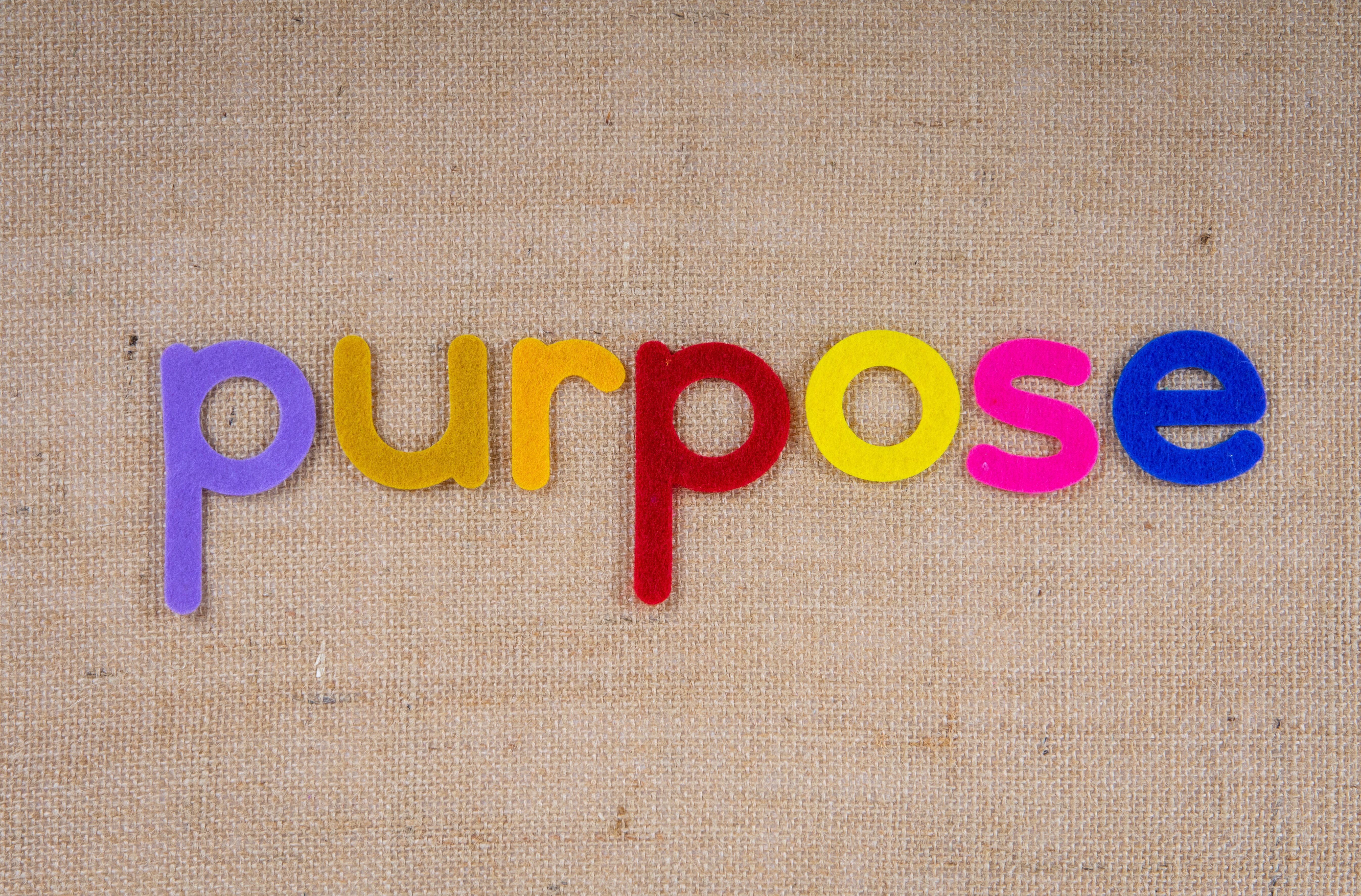
For example, we could set out to write about global warming for different purposes. We might simply aim to make people believe that global warming is real. Alternately, we might try to convince readers to make drastic changes in their lives to combat climate change, or to protest a particular company responsible for climate change. Our purpose will shape the ideas we express, but it will also shape the emotional appeals we make.
Identifying our purpose can help us decide what we need to include to achieve that purpose. Often arguments with a particular kind of purpose will share common features. Below we will describe four kinds of research-based essays, each of which we will explore in more depth in a later section of this chapter.
Purposes for research papers
We can ask ourselves which of the following best describes our purpose:
- We want to describe the nature of something.
- We want to assess how good or bad something is.
- We want to demonstrate that one thing causes or caused another.
- We want to propose some action.
An argument may contain multiple elements from this list, but if we can decide which is ultimately the most important, we can shape the introduction and conclusion with that goal in mind. Each type of argument has particular questions that may be worth addressing, as we will explore in the later sections.
In the following sections, we suggest strategies and components of four different types of arguments, matched to the four purposes mentioned above.
- Definition arguments describe the nature of something or identify a pattern or trend. Generally speaking, they answer the question, “What is it?”
- Evaluation arguments assess something according to particular criteria. They answer the question, “How good or bad is it?”
- Causal arguments attempt to show that one thing leads to or has led to another. They answer the question, “What caused it?”
- Proposal arguments present a case for action. They answer the question, “What should we do about it?”
Let’s look at some examples of argument purposes divided into these categories.
Definition argument examples
- We want readers to know what kinds of communication dolphins are capable of.
- We want to clarify which groups of people the term “Latinx” refers to.
- We want to show how Kurdish communities differ in Iraq, Syria, and Turkey.
Evaluation argument examples
- We want to recommend a gaming device.
- We want to convince readers that the Supreme Court decision to give corporations First Amendment rights to free speech was misguided.
- We want to show that a new Alzheimer’s drug meets the criteria for emergency use authorization.
Causal argument examples
- We want to argue that the attack on the United States Capitol on January 6, 2021 actually made Americans value American democracy more and want to protect it.
- We want to show that parents can’t change a child’s feeling of being male, female, or nonbinary.
- We want to suggest that the Covid-19 pandemic led to an increase in internet addiction.

Proposal argument examples
- We want readers to take the online Harvard Implicit Association Tests and reflect on what the results suggest about their unconscious biases.
- We want legislators to double the gas tax in order to speed up the transition to clean energy.
- We want to make community college free for all Americans.
Comparing and contrasting for different purposes
It's worth noting that we may want to discuss more than one thing for any of the purposes above. If we are comparing and contrasting two or more things in our essay, we will want to think about essay structure for compare and contrast essays as well as thinking about the elements of the argument according to the overall purpose. See Section 3.9: Comparing and Contrasting Arguments for more on this.
Practice exercise \(\PageIndex{1}\)
For each argument below, select the category that best describes the argument’s purpose. Explain how it fits the category.
- Muslim women should be allowed to wear full face and body coverings such as burkas in public if they choose.
- Minecraft play offers many opportunities for creativity and learning.
- The explosion of mental health content on TikTok has reduced the shame many people feel about their mental health issues.
- Only apartments where the rent is less than 30% of a minimum wage worker’s income can truly be considered “affordable housing.”
- Composting food waste can generate energy with a minimum of greenhouse gas emissions.
Attributions

Want to create or adapt books like this? Learn more about how Pressbooks supports open publishing practices.
1.17 Writing Style: Objective and Subjective
What is style.
In English speaking and writing contexts, styles can be categorized into two distinct groups: subjective and objective. A combination of both styles, however, can be used. Skilled writers know how to distinguish the two. They also know which style or which combination of styles is appropriate for which context. Likewise, careful readers can detect which style(s) is (are) being used in a given text.
The term subjective is used to describe a writing style that is based on personal beliefs or preferences. Subjective language often
- includes personal pronouns,
- is emotive,
- is exaggerated, and
- passes judgements.
The term objective is used to describe a writing style that focuses on facts and uses balanced, disinterested language that leads readers to critically evaluate the content presented in the text. Objective writing style does, in fact, include judgement. The judgements are supported by facts and are presented in a distant way.
Examples of Subjective and Objective Writing Style
She loves the snow. (opinion)
It is snowing heavily. (fact)
She loves the snow because she is a skier. (opinion with a fact)
Employees will probably be late to work today because it is snowing heavily. (prediction based on fact)
The order picker messed up our order terribly. (opinion, emotive language)
The order picker neglected to include several items in our order. (vague fact, negative language)
The order picker messed up our order; he neglected to include several items. (vague fact, negative language)
Two boxes of cleaning solution were not included in this morning’s order. (fact presented in an impartial manner)
In 2016, Zara launched its Join Life line as an initial step towards increasing product sustainability. (fact)
In 2016, Zara launched its Join Life line as an initial step towards supposedly increasing product sustainability. (fact, emotive language challenging the fact)
The Join Life women’s collection consists of about 280 pieces. (fact)
Zara’s other collections include about 1,500 items in its women’s dress category. (fact)
While Zara purports to be interested in sustainability, its sustainability collection includes only 280 items. (fact, judgement)
Zara is simply trying to trick customers into believing that it is concerned about sustainability, for a mere 280 of its items are part of its Join Life line. Moreover, most of its products are manufactured by underpaid labourers who live in some of the poorest countries in the world. (strong judgement supported by some fact, strong emotive language)
Compared to its other collection of over 1,500 items, Zara’s sustainability collection includes only 280 items. It, therefore, appears that Zara’s is doing little to address sustainability issues. (judgement based on fact, language is distanced)
The content about Zara was sourced and adapted from the reference below.
Objective Style in Report Writing
A report is a document created to impart information to a specific audience for a specific purpose. In the business world, reports can be informational or analytical. Whether informational or analytical, report writers present their information using balanced, disinterested language so that report readers can make their own conclusions once they have read the report. Therefore, it is critical for report writers to use effective structure and appropriate language.
Well written reports
- are effectively structured,
- include critical analysis of research,
- provide various perspectives if required,
- include evidence-based arguments, and
- maintain an objective tone.
Strategies for Achieving an Objective Tone
1. use the passive voice (sparingly).
Since the passive voice removes the actor from the sentence, using it is an effective way of establishing an objective tone. While using the passive voice is effective, a report that relies heavily on it would be cumbersome to read, so it should be used sparingly.
2. Use Ergative Verbs
To convert some passive voice constructions, use ergative verbs. Ergative verbs are used in the active voice even though they do not have a real actor. Common ergative verbs used in business include begin, start, increase, decrease, accumulate, reduce, advance, and improve.
3. Focus on the evidence.
Use introductory words or phrases that focus on the evidence.
- The study highlights
- The graph indicates
- The report suggests
4. Use information from your sources.
- Olive (2021) summarizes the Icelandic study. He notes….
- In his article, Rodriguez (2021) comments on Canadian work culture.
5. Use “It and There” sentences.
These sentences are often used with hedges (to soften the information) and boosters (to strengthen information). Such sentence constructions allow comments on something without using subjective language.
6. Personify the subject of the sentence.
Use phrases as indicated in the examples below.
- This report explores some effective implementations of the four-day work week.
- This report concludes that more research should be conducted before Company ABS considers implementing a four-day work week.
Coughlan, B. (2021, June 21). Why most eco-lines are just another form of greenwashing . re/make. https://remake.world/stories/news/why-most-eco-lines-are-just-another-form-of-greenwashing/?gclid= EAIaIQobChMIh9WL3MDj8wIVqGpvBB3KJQlVEAMYASAAEgJeVPD_BwE#post-14925
Writing and Critical Thinking Skills for BUSN732 Students Copyright © by Sylvia Vrh-Zoldos and Lillian Mak is licensed under a Creative Commons Attribution 4.0 International License , except where otherwise noted.
Share This Book
“Objective” vs. “Subjective”: What’s the Difference?

Objective and subjective are two common—and commonly confused —words used to describe, among other things, information and perspectives.
The difference between objective information and subjective information is that the former is based on facts, while the latter is based on feelings or opinions.
Below, we’ll talk about the difference between objective and subjective , how to use them in writing, and when each one is appropriate.
Give your writing extra polish Grammarly helps you communicate confidently Write with Grammarly
The difference between objective and subjective
The basic difference between objective and subjective information is that objective information is based on facts, while subjective information, or a subjective perspective, is based on opinion, emotion, or feelings.
The line between the two seems simple on paper, but in practice, their meanings can blur. Why? The main reason is that people who use these words are just that: people. And people have backgrounds, experiences, emotions, and biases that can show up in subtle ways. Often, even if we think we’re being objective, there may be subjective influences at play.
Definition of objective
Objective means not influenced by personal feelings or opinions in considering or representing facts.
An objective perspective refers to a viewpoint or approach that is unbiased, impartial, and based on facts and verifiable evidence.
For example, this is an objective statement:
Water boils at 212 degrees Fahrenheit.
Water has an objective temperature that it must reach in order to boil, which can be quantified, tested, and proved over and over again.
What is objectivity in writing?
In writing, objectivity is found in works that present facts and their verifiable evidence. Examples of objective writing are research papers, instruction manuals, and academic essays. These types of writing strive for accuracy and to create a foundation of knowledge.
Definition of subjective
Subjective means based on, or influenced by, personal feelings, tastes, or opinions. A subjective perspective can also be called a personal perspective or an individual point of view . Subjective views do not have to be provable or grounded in fact, though they may incorporate facts. For example:
The frosting on that cake makes it too sweet.
This is a subjective take on cake. What one person considers “too sweet” is based entirely on their personal preferences. The cake might not be sweet enough for some and just right for others.
What is subjectivity in writing?
In writing, subjectivity refers to the expression of a writer’s personal opinions, feelings, beliefs, and perspectives.
Subjective writing often involves first-person pronouns ( I , me , my ) and emotional language, as the writer shares their thoughts and reactions openly. It can be found in various forms of writing, including personal essays, memoirs, creative fiction, and opinion pieces .
Here are examples of subjective writing elements:
Personal pronouns :
- In my opinion
- From my perspective
Evocative adjectives :
- The painting evoked a sense of peace for me.
- The novel was thought-provoking.
Value judgments:
- That was the best movie of the year.
- That concert was disappointing.
In grammar, subjective means related to the subject of a sentence. That’s a different definition from the one we’re using here. You can read more about subjective and objective cases in grammar here .
How to use objective vs. subjective
Being able to tell the difference between objective and subjective information will make you a better communicator, decision-maker, and problem-solver. Depending on what industry you’re in, you may lean more heavily on one type of information than the other.
Objective information is important in fields that rely on facts and evidence, such as scientific research, journalism, and law.
It’s important to note that achieving complete objectivity is a difficult task, since everyone is informed by their backgrounds and experiences. While people in these disciplines should strive for objectivity, they should also consider how their experiences may affect the product of their work.
For example, members of a jury are instructed to analyze a case objectively and base their conclusions only on the facts presented. However, the court system can’t avoid the fact that jury members are human beings, and every human brings their own experiences and biases to a situation. That’s why courts have a jury selection process that attempts to eliminate jurors whose personal experiences may cloud their judgment.
Subjective perspectives, on the other hand, play a vital role in art, literature, and therapy, since these disciplines allow, or even require, individuals to share their unique experiences and emotions.
Examples of objective vs. subjective
The art critic acknowledged that the only objective parts of his assessment were the painting’s title and the artist’s name, while everything else was subjective , influenced by his extreme distaste for the color green.
The tourism survey aimed to collect both objective data, like what time of year the participant visited, and subjective feedback, like whether they had a good time, to gain a comprehensive understanding of their experience at the resort.
When discussing controversial topics, it’s essential to remain objective so you don’t let subjective biases influence your argument.
In the book review, the critic provided an objective summary of the plot and style, while also sharing their subjective thoughts on the novel’s emotional impact.
The journalist strived to present the news objectively , reporting only the facts she collected without injecting subjective opinions or interpretations.
Objective vs. subjective FAQs
What do objective and subjective mean.
Objective means verifiable information based on facts and evidence. Subjective means information or perspectives based on feelings, opinions, or emotions.
What are examples of subjective and objective ?
This is an example of subjective information: Lemon cake is the best dessert in the world.
This is an example of objective information: Lemons have high concentrations of vitamin C.
When should you use objective vs. subjective ?
Use objective when presenting facts that you can prove with irrefutable evidence. Use subjective when presenting a point of view, perspective, or opinion.
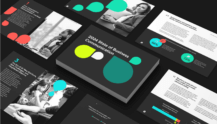

How to Write Objectives | A Step-to-step Guide (2023)
Astrid Tran • 31 Aug 2023 • 6 min read
Objectives are needed for every aspect of life, work and education.
Whether you are setting objectives for academic research, teaching and learning, courses and training, personal development, professional growth, a project, or more, having clear objectives like having a compass to help you stay on track.
So, how to write objectives? Check out this article to get a complete guide on writing realistic and impactful objectives.
Table of Contents
How to write objectives of a project
How to write objectives for a presentation, how to write objectives for lesson plan, how to write objectives for a research, how to write objectives for personal growth.
More tips on how to write objectives
Frequently Asked Questions
Project objectives often focus on tangible results, such as completing specific tasks, delivering products, or achieving certain milestones within a defined timeframe.
Writing project objectives should follow these principles:
Start early : It is important to set your project objectives at the beginning of your project to avoid unexpected situations and employees misunderstanding.
Changes : Project objectives can be determined to address challenges of previous projects experience and seek to minimize potential risks prior to the project begins.
Achievement : An objective of a project should mention what success is. Different success is measured by specific and measurable objectives.
OKR : OKR stands for “objectives and key results,” a managerial model that aims to set goals and identify metrics to measure progress. Objectives are your destination, while key results contribute to the path that will get you there.
Focus : Different project objectives might consist of related issues such as:
- Customer satisfaction
- Turnover and Retention
- Sales and Revenue
- Return on investment (ROI)
- Sustainability
- Productivity
For example :
- The goal of the campaign is to improve the traffic by 15% before the end of the first quarter.
- This project aims to produce 5,000 units of products in the next three months.
- Add five new methods for clients to seek the feedback form in-product within the next three months.
- Increase click through rate (CTR) engagement on email by 20% by the end of the second quarter.
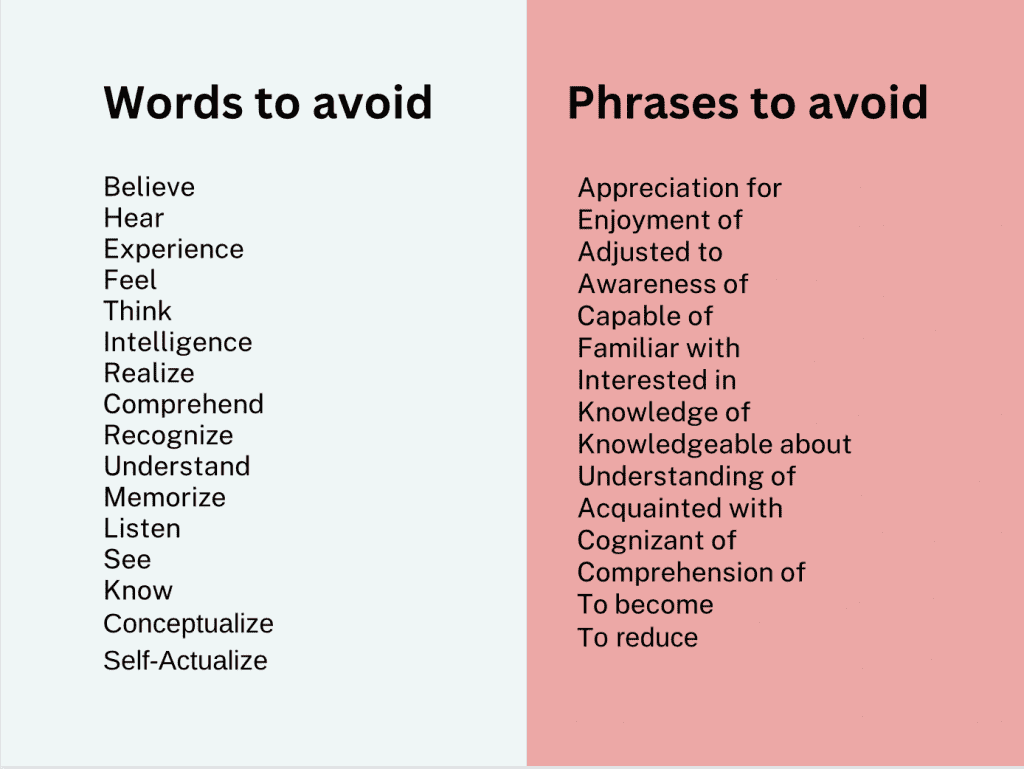
Presentation objectives outline what you intend to accomplish with your presentation, which might involve informing, persuading, educating, or inspiring your audience. They guide the content creation process and shape how you engage your listeners during the presentation.
When it comes to writing presentation objectives, there are some notes to look at:
The questions “Why” : To write a good presentation objective, start with answering why questions, such as Why is this presentation important to your audience? Why should people invest time and money to attend this presentation? Why is your content important to the organization?
What do you want the audience to know, feel and do ? Another important of writing objectives for a presentation is considering the comprehensive impact your presentation has on the audience. This pertains to the informational, emotional, and actionable aspect.
Rule of three : When you write your objectives in your PPT, don’t forget to express no more than three key points per slide.
Some examples of objectives:
- Ensure the managers understand that without additional funding of $10,000, the project will fail.
- Get commitment from the director of sales to a three-tier pricing proposal for customer Prime.
- Get the audience to commit to reducing their personal plastic usage by signing a pledge to avoid single-use plastics for at least a week.
- Participants will feel empowered and confident about managing their finances, replacing financial anxiety with a sense of control and informed decision-making.

Get your Students Engaged
Start meaningful discussion, get useful feedback and educate your students. Sign up to take free AhaSlides template
Learning objectives, often used in education and training, specify what learners are expected to gain from a learning experience. These objectives are written to guide curriculum development, instructional design, and assessment.
A guide on writing an objective for learning and lesson plan described as follows:
Learning objectives verbs : There is no better way to have learning objectives start with measurable verbs collected by Benjamin Bloom based on level of cognition.
- Knowledge level: tell, uncover, show, state, define, name, write, recall,…
- Comprehension level: indicate, illustrate, represent, formulate, explain, classify, translate,…
- Application level: perform, make a chart, put into action, build, report, employ, draw, adapt, apply,…
- Analysis Level: analyze, study, combine, separate, categorize, detect, examine,…
- Synthesis Level: integrate, conclude, adapt, compose, construct, create, design,…
- Evaluation Level: evaluate, interpret, decide, solve, rate, appraise, verify,…
Student-centered : Objectives should reflect the unique aspirations, strengths and weaknesses of each student, emphasize what students will know or be able to do, not what you will teach or cover.
Learning Objective Examples:
- To recognize the power of different types of language
- By the end of this course, students will be able to identify and develop data collection instruments and measures for planning and conducting sociological research.
- By the end of this course, students will be able to identify their own position on the political spectrum.
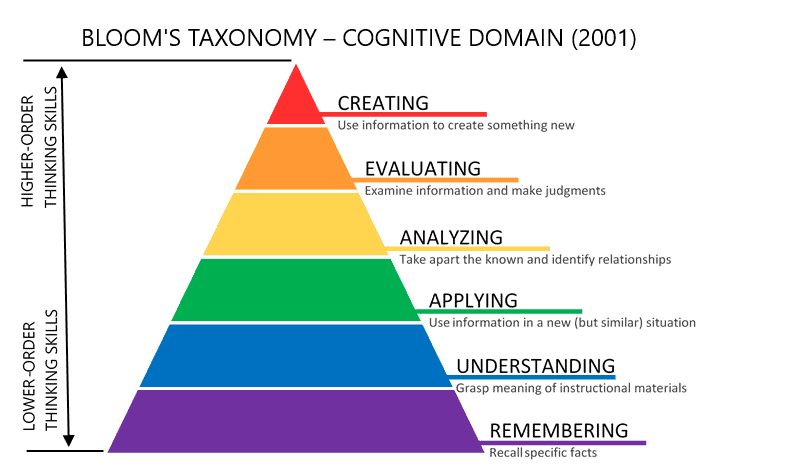
The purpose of research objectives is congruent with research study outcomes.They articulate the purpose of the research, what the researcher intends to investigate, and the expected outcomes.
There are severals principles to follow to ensure a well-written research objectives:
Academic language : It is important to note that research writing is strict on the use of language. It is held to a high standard of clarity, precision, and formality.
Avoid using first-person references to state the objectives. Replace “I will” with neutral phrasing that emphasizes the research’s intention. Avoid emotional language, personal opinions, or subjective judgments.
Pinpoint the Focus : Your research objectives should clearly articulate what your study aims to investigate, analyze, or uncover.
Specify the Scope : Outline the boundaries of your research by specifying the scope. Clearly delineate what aspects or variables will be examined, and what will not be addressed.
Maintain Consistency with Research Questions : Ensure your research objectives align with your research questions.
Frequently used phrases in research objectives
- …contribute to the knowledge of…
- …search for…
- Our study will also document….
- The primary objective is to integrate…
- The purposes of this research include:
- We attempt to…
- We formulated these objective based on
- This study searches for
- The second gold is to test
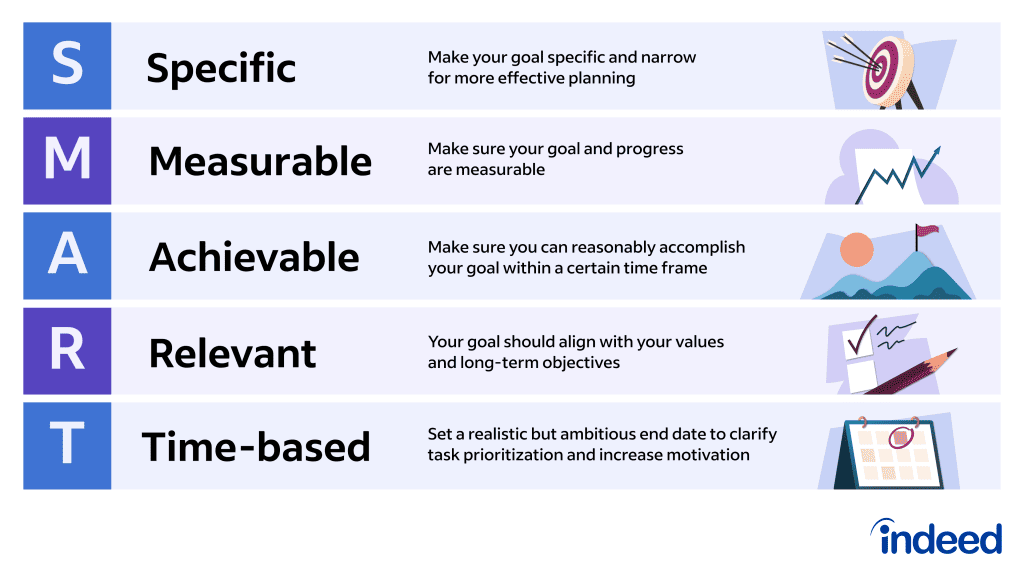
Objectives for personal growth often focus on individual improvement on skills, knowledge, well-being, and overall development.
Personal growth objectives encompass various aspects of life, including emotional, intellectual, physical, and interpersonal dimensions. They serve as roadmaps for continuous learning, growth, and self-awareness.
- Read one non-fiction book each month to expand knowledge in areas of personal interest.
- Incorporate regular exercise into the routine by walking or jogging for at least 30 minutes five times a week.
Tips to write objectives for personal growth from AhaSlides.
💡 Development Goals For Work: A Step-By-Step Guide For Beginners with Examples
💡 What is Personal Growth? Set Up Personal Goals For Work | Updated in 2023
💡 Work Goals Examples For Evaluation with +5 Steps To Create in 2023
How to write objectives in general? Here are common tips for setting objectives of any field.
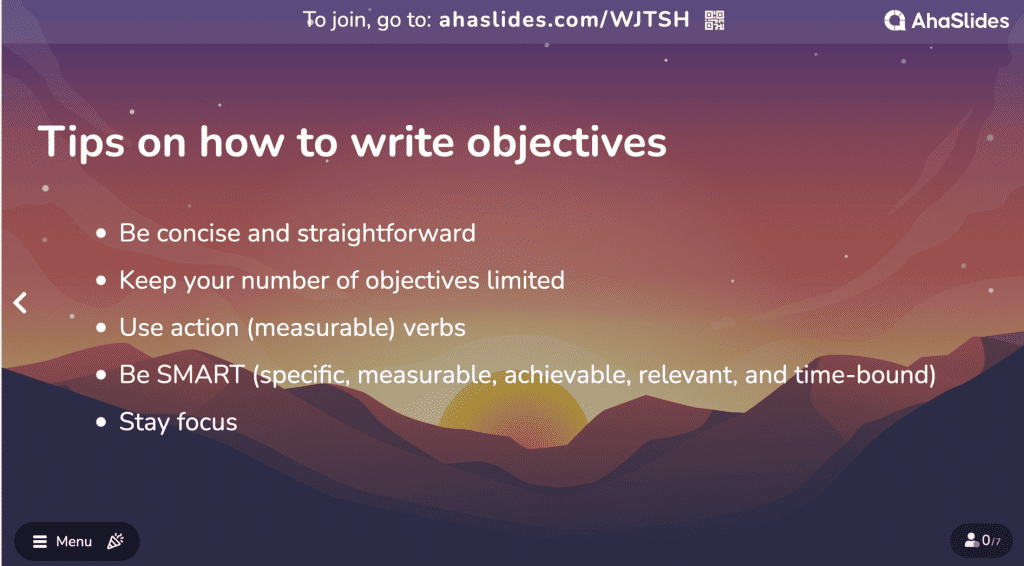
#1. Be concise and straightforward
Keep the words as simple and straightforward as much as possible. It is much better to remove unnecessary or ambiguous words that might lead to misunderstanding.
#2. Keep your number of objectives limited
Don’t confuse your learners or readers with too many objectives. Concentrating on a few key objectives can effectively maintain focus and clarity and prevent overwhelming.
#3. Use action verbs
You can start each objective with one of the following measurable verbs: Describe, Explain, Identify, Discuss, Compare, Define, Differentiate, List, and more.
#4. Be SMART
SMART objectives framework can be defined with specific, measurable, achievable, relevant, and time-bound. These objectives are clearer and easier to understand and achieve.
⭐ Want more inspiration? Check out AhaSlides to explore the innovative way to get presentations and lesson engaging and fun!
What are the 3 parts of an objective?
According to Mager (1997), objective statements contain three parts: behavior (or, performance), conditions, and criteria.
What are the 4 elements of a well-written objective?
The four elements of an objective are Audience, Behavior, Condition, and Degree, called A-B-C-D method. They are used to identify what a student is expected to know and how to test them.
What are the 4 components of objective writing?
There are four components of an objective include: (1) the action verb, (2) conditions, (3) standard, and (4) the intended audience (always the students)
Ref: Indeed | Batchwood |

Astrid Tran
I've got my rhythm with words
More from AhaSlides


Subjective vs. Objective: Understanding the Key Differences for Stronger English Writing
By: Author ESLBUZZ
Posted on Last updated: August 5, 2023
Sharing is caring!
Welcome to our article on the differences between subjective vs objective. If you’re someone who wants to improve your writing or grammar skills, understanding the distinction between these two terms is essential. In this article, we’ll explore what subjective and objective mean, provide examples of each, and discuss when to use them in your writing.
Subjective refers to something that is based on personal opinions or feelings. It is often influenced by an individual’s experiences, beliefs, and biases. In contrast, objective refers to something that is based on facts and observations, free from personal opinions or emotions. It is grounded in evidence and can be verified by others.
Understanding the difference between subjective and objective is crucial when writing. Depending on the context, using the wrong term can lead to confusion or miscommunication. By the end of this article, you’ll have a clear understanding of when to use subjective vs objective, and how to use them effectively in your writing. So, let’s dive in!
Subjective vs. Objective

Understanding the Concepts
Defining Subjective
When we say that something is subjective, we mean that it is based on personal opinions, feelings, or perspectives. In other words, it’s something that is influenced by an individual’s experiences and beliefs. Subjective statements are often used to express personal opinions, emotions, or preferences.
For example: “I think that chocolate ice cream is the best flavor.” This statement is subjective because it reflects the personal opinion of the speaker. Another example could be: “In my opinion, the movie was boring.” Here, the speaker is expressing their subjective view on the movie.
Defining Objective
On the other hand, when we say that something is objective, we mean that it is based on facts and evidence. Objective statements are not influenced by personal beliefs or biases. They are based on observable phenomena and can be verified by others.
For example: “The Earth revolves around the sun.” This statement is objective because it is based on scientific evidence that has been verified by many people. Another example could be: “The temperature outside is 25 degrees Celsius.” This statement is objective because it is based on a measurable and observable phenomenon.
Comparing Subjective vs. Objective
In Terms of Perception
Subjective and objective are two words that are often used in writing and communication. They are used to describe different ways of looking at things, and they have different meanings depending on the context in which they are used.
Subjective refers to something that is based on personal opinions, feelings, or beliefs. It is often used to describe things that are open to interpretation, such as art, music, or literature. When something is subjective, it means that it can be perceived differently by different people, depending on their personal experiences or biases.
On the other hand, objective refers to something that is based on facts, evidence, or logic. It is used to describe things that are not influenced by personal feelings or opinions. When something is objective, it means that it can be measured, observed, or proven in some way.
In Terms of Usage in Writing
Subjective and objective are also important concepts in writing. When writing, it is important to understand the difference between the two and to use them appropriately.
Subjective language is often used in creative writing, such as poetry or fiction. It is also used in personal essays or memoirs. In these types of writing, the writer is expressing their own thoughts, feelings, and experiences, and the language is often emotive or descriptive.
Objective language, on the other hand, is used in academic writing, such as research papers or scientific reports. It is also used in news articles or other types of journalism. In these types of writing, the language is factual and precise, and the writer strives to present information in an unbiased and impartial way.
Examples in English Grammar
Examples of Subjective Usage
When using subjective language in English grammar, you are expressing your personal opinion or feelings about a certain topic. This type of language is often used in creative writing, personal narratives, and conversations with friends or family. Here are some examples of subjective language in English:
- I think that the movie was amazing.
- In my opinion, the book was very well-written.
- To me, the painting looks beautiful.
As you can see, these sentences all express the writer’s personal opinion about a certain topic. They cannot be proven or disproven, as they are based on individual experiences and perceptions.
Examples of Objective Usage
In contrast, objective language in English grammar refers to factual information that can be proven or verified. This type of language is often used in news articles, scientific reports, and academic writing. Here are some examples of objective language in English:
- The temperature outside is 25 degrees Celsius.
- The population of New York City is 8.4 million.
- The chemical formula for water is H2O.
These sentences provide factual information that can be backed up by evidence. They are not based on personal opinions or feelings, but rather on concrete data and facts.
To better illustrate the differences between subjective and objective language in English, here’s a table:
In conclusion, understanding the differences between subjective and objective language in English grammar is essential for effective communication. By knowing when to use each type of language, you can convey your message accurately and clearly to your audience.
Implications in English Writing
When it comes to English writing, the choice between subjective and objective writing can have significant implications. Both forms have their advantages and disadvantages, and it is crucial to understand them to make an informed decision.
Impact of Subjective Writing
Subjective writing is based on personal viewpoints, opinions, and biases. It is often used in creative writing, such as poetry, fiction, and personal essays. Subjective writing can be more engaging and captivating, as it allows the writer to express their emotions and feelings. However, it can also be less credible and objective, as it is based on personal experiences and perspectives.
Here are some examples of subjective writing:
- In my opinion, the movie was fantastic.
- I love this restaurant because the food is delicious.
- The sunset was the most beautiful thing I’ve ever seen.
Impact of Objective Writing
Objective writing, on the other hand, is based on factual data that is not influenced by personal beliefs or biases. It is often used in academic writing, such as research papers, scientific reports, and news articles. Objective writing can be more credible and reliable, as it is based on verifiable facts. However, it can also be less engaging and less captivating, as it lacks personal perspectives and emotions.
Here are some examples of objective writing:
- According to the latest research, the vaccine is effective in preventing the disease.
- The company’s revenue increased by 10% last quarter.
- The temperature outside is 25°C.
To illustrate the differences between subjective vs. objective writing, here is a comparison table:
In conclusion, the choice between subjective and objective writing depends on the purpose, audience, and context of the writing. Both forms have their strengths and weaknesses, and it is essential to choose the appropriate one to achieve the desired effect.
Frequently Asked Questions
What are some examples of subjective and objective writing styles?
Subjective writing style includes personal opinions, feelings, and biases. For example, “I believe that chocolate ice cream is the best flavor.” Objective writing style, on the other hand, is based on facts and evidence. For instance, “Chocolate ice cream contains cocoa powder, sugar, and cream.”
How can I differentiate between subjective and objective statements?
Subjective statements are based on personal opinions and feelings, while objective statements are based on facts and evidence. To differentiate between them, ask yourself if the statement can be proven with evidence or if it is based on personal beliefs.
What is the difference between objective and subjective data?
Objective data is based on facts and evidence that can be measured or observed. For example, the temperature outside is 75 degrees Fahrenheit. Subjective data is based on personal opinions, feelings, or experiences. For instance, “I feel happy today.”
What is the significance of using objective language in writing?
Using objective language in writing ensures that the information presented is based on facts and evidence, making it more credible and trustworthy. It also helps to avoid personal biases and emotions that can cloud judgment.
How does subjective vs objective assessment affect the outcome?
Subjective assessment can be influenced by personal biases and emotions, which can lead to inaccurate results. Objective assessment, on the other hand, is based on facts and evidence, resulting in more accurate and reliable outcomes.
What is the role of subjective vs objective philosophy in language usage?
Subjective philosophy emphasizes personal beliefs and opinions, while objective philosophy focuses on facts and evidence. In language usage, subjective philosophy can lead to biased and emotional language, while objective philosophy leads to more factual and credible language.
Subjective writing style includes personal opinions, feelings, and biases. For example, \"I believe that chocolate ice cream is the best flavor.\" Objective writing style, on the other hand, is based on facts and evidence. For instance, \"Chocolate ice cream contains cocoa powder, sugar, and cream.\"
"}},{"@type":"Question","name":"How can I differentiate between subjective and objective statements?","acceptedAnswer":{"@type":"Answer","text":"
"}},{"@type":"Question","name":"What is the difference between objective and subjective data?","acceptedAnswer":{"@type":"Answer","text":"
Objective data is based on facts and evidence that can be measured or observed. For example, the temperature outside is 75 degrees Fahrenheit. Subjective data is based on personal opinions, feelings, or experiences. For instance, \"I feel happy today.\"
"}},{"@type":"Question","name":"What is the significance of using objective language in writing?","acceptedAnswer":{"@type":"Answer","text":"
"}},{"@type":"Question","name":"How does subjective vs objective assessment affect the outcome?","acceptedAnswer":{"@type":"Answer","text":"
"}},{"@type":"Question","name":"What is the role of subjective vs objective philosophy in language usage?","acceptedAnswer":{"@type":"Answer","text":"
- Recent Posts
- Mastering English Writing: Essential Transitional Words for Body Paragraphs - March 25, 2024
- 100+ Essential Contrast Transition Words for Exceptional English Writing - March 25, 2024
- Short E Words: Enhance Your Vocabulary with Easy Examples - March 23, 2024
Related posts:
- Less or Fewer? Let’s Clear the Confusion Once and for All!
- Gen Z vs. Millennials: The Battle of the Generations!
- Heros or Heroes? The Battle of the Spellings!
- Hypothesis vs. Theory: A Simple Guide to Tell Them Apart
We use cookies to enhance our website for you. Proceed if you agree to this policy or learn more about it.
- Essay Database >
- Essay Examples >
- Essays Topics >
- Essay on Business
An Objective-Based Plan: Essay Examples
Type of paper: Essay
Topic: Business , Decision , Management , Decision Making , Services papers , Elderly , Goals , Health
Published: 12/06/2021
ORDER PAPER LIKE THIS
Business Decision-making Plan:
Introduction: Decision making is an important aspect toward the survival and success of any business. Decisions that are entrenched on a substantial body of facts and logical reasoning can steer the company into long-lasting prosperity (Walden, 2014). However, decisions that are made based on inadequate logic, emotionalism, and imperfect information can drastically bring the business down and fail in its operation. Bad decisions have been the prime contributors to the decline and fall of vast, capital-intensive companies over time. All entrepreneurs realize the painful demand and necessity of choice, which is often inevitable.
In the management of the Newman Eldercare Services (NES), the entrepreneur is facing the dilemma of choosing between the best course of action amid multiple limiting factors, and this describes the inherent process of decision making. For any decision made, the problem being solved forms the central part of the process (Silver, 2014). In this case, the decision will be made against the strengths, weaknesses, opportunities, and threats, with the business goals and objectives under consideration. The attempt to solve this problem then defines the legitimation of a choice, and the procedural and technical aids must then be evaluated. Therefore, a solid plan must be formulated judiciously to guide the decision-making process, and work towards achieving the prime objective- providing quality health services to the elderly population. This report will focus on one major decision, that is, provision of medical services and innovative programs that meet the needs of the elderly people and their families. As one of the NES core objectives, this element will be perceived as the main problem, and finding its solution will be to decide on implementing it or to diminish the competitive edge against other rival elderly care facilities.
Critical components of the plan:
Financial evaluation: All business decisions are always guided by the financial position of the firm, against its resource allocation priorities. It is evident that the company has met the right status for the acquisition of Medicare and Medicaid funds under some reimbursement criteria. Therefore, it will be reasonable to invest in advanced programs such as, aerobics, gymnastics and physical fitness activities, arthritis management and chronic diseases programs, and other self-care intervention plans that will encourage the elderly people to take healthy decisions for their lives (Bauman, 2013).
It will be important for the elderly-care facility to assess its staffing capacities, and evaluate the need to recruit and hire more professional expertise in the newly introduced programs. In this regard, NES management will evaluate the skills, knowledge, and professional certification attributes required to meet effectively the demands of the newly introduced programs (Ellis, 2013).
Customer satisfaction:
Before introducing any service or commodity (as a decision), carrying out a feasibility study on the clientele needs across the target population is imperative. From the SWOT analysis conducted previously, it is clear that provision of innovative health programs and extending the facility operational hours prevails as a prospective business opportunity (Bauman, 2013). It is evident that clients have always requested for some of these medical services, such as the chronic diseases management programs, but to no avail. Therefore, carrying out a customer satisfaction survey will comprise a core part of the plan.
Internal business processes:
The internal business processes define the spheres on operations management that focus on improving the asset utilization, risk management and supply chain management; customer management processes-all the procedures that expands and deepen the firm-clientele relationships through the innovation of programs and quality services delivery, and the regulatory and social principles that focus on building good and solid relationships with the external stakeholders. Consequently, any decision implemented must collectively embody these elements towards achieving the goals and objectives of NES (Ellis, 2013). Components of the NES decision plan:
References:
Bauman, E. B. (2013). Game-based teaching and simulation in nursing and healthcare. New York: Springer Pub. Co. Ellis, P. (2013). Evidence-based practice in nursing. London: Sage/Learning Matters Silver, S. D. (2014). Decision making groups and teams: An information exchange perspective. New York: Routledge. Walden, Joseph. (2014). Decision Making in Business. Kendall Hunt Pub Co. Williams, R. G. (2005). Decision making in business. Harlow: Pearson Education.

Cite this page
Share with friends using:
Removal Request

Finished papers: 434
This paper is created by writer with
If you want your paper to be:
Well-researched, fact-checked, and accurate
Original, fresh, based on current data
Eloquently written and immaculately formatted
275 words = 1 page double-spaced

Get your papers done by pros!
Other Pages
Criminal justice essay, essay on the animal kingdom storms reality tv and the documentary industry, report on the social and environmental impact of geothermal energy, course work on image consultancy, essay on eating chilli peppers, importance of product and process design case study, huckleberry finn essay, essay on recommendations for acme, report on power politics and knowledge, essay on venue and jurisdiction, example of research paper on traditional litigation versus nontraditional forms of adr, case study on strength, example of essay on textile pongee fabric, free organizational communication v deck in retrospect essay sample, cicero essays, talk radio essays, joyce carol oates essays, ralph ellison essays, enron scandal essays, emmett till essays, sweatshops essays, merchants of cool essays, mary rowlandson essays, spiritualism essays, medieval europe essays, wildfires essays, gary soto essays, freyr essays, george m cohan essays, shakespeare argumentative essays, security argumentative essays, president argumentative essays, flag case studies, quadrant case studies, economic condition case studies, seizure case studies, partridge case studies, fad case studies, airbus case studies, actus reus case studies, debris case studies, compass case studies, elevator case studies.
Password recovery email has been sent to [email protected]
Use your new password to log in
You are not register!
By clicking Register, you agree to our Terms of Service and that you have read our Privacy Policy .
Now you can download documents directly to your device!
Check your email! An email with your password has already been sent to you! Now you can download documents directly to your device.
or Use the QR code to Save this Paper to Your Phone
The sample is NOT original!
Short on a deadline?
Don't waste time. Get help with 11% off using code - GETWOWED
No, thanks! I'm fine with missing my deadline
Have a language expert improve your writing
Run a free plagiarism check in 10 minutes, generate accurate citations for free.
- Knowledge Base
- Starting the research process
- Research Objectives | Definition & Examples
Research Objectives | Definition & Examples
Published on July 12, 2022 by Eoghan Ryan . Revised on November 20, 2023.
Research objectives describe what your research is trying to achieve and explain why you are pursuing it. They summarize the approach and purpose of your project and help to focus your research.
Your objectives should appear in the introduction of your research paper , at the end of your problem statement . They should:
- Establish the scope and depth of your project
- Contribute to your research design
- Indicate how your project will contribute to existing knowledge
Table of contents
What is a research objective, why are research objectives important, how to write research aims and objectives, smart research objectives, other interesting articles, frequently asked questions about research objectives.
Research objectives describe what your research project intends to accomplish. They should guide every step of the research process , including how you collect data , build your argument , and develop your conclusions .
Your research objectives may evolve slightly as your research progresses, but they should always line up with the research carried out and the actual content of your paper.
Research aims
A distinction is often made between research objectives and research aims.
A research aim typically refers to a broad statement indicating the general purpose of your research project. It should appear at the end of your problem statement, before your research objectives.
Your research objectives are more specific than your research aim and indicate the particular focus and approach of your project. Though you will only have one research aim, you will likely have several research objectives.
Receive feedback on language, structure, and formatting
Professional editors proofread and edit your paper by focusing on:
- Academic style
- Vague sentences
- Style consistency
See an example

Research objectives are important because they:
- Establish the scope and depth of your project: This helps you avoid unnecessary research. It also means that your research methods and conclusions can easily be evaluated .
- Contribute to your research design: When you know what your objectives are, you have a clearer idea of what methods are most appropriate for your research.
- Indicate how your project will contribute to extant research: They allow you to display your knowledge of up-to-date research, employ or build on current research methods, and attempt to contribute to recent debates.
Once you’ve established a research problem you want to address, you need to decide how you will address it. This is where your research aim and objectives come in.
Step 1: Decide on a general aim
Your research aim should reflect your research problem and should be relatively broad.
Step 2: Decide on specific objectives
Break down your aim into a limited number of steps that will help you resolve your research problem. What specific aspects of the problem do you want to examine or understand?
Step 3: Formulate your aims and objectives
Once you’ve established your research aim and objectives, you need to explain them clearly and concisely to the reader.
You’ll lay out your aims and objectives at the end of your problem statement, which appears in your introduction. Frame them as clear declarative statements, and use appropriate verbs to accurately characterize the work that you will carry out.
The acronym “SMART” is commonly used in relation to research objectives. It states that your objectives should be:
- Specific: Make sure your objectives aren’t overly vague. Your research needs to be clearly defined in order to get useful results.
- Measurable: Know how you’ll measure whether your objectives have been achieved.
- Achievable: Your objectives may be challenging, but they should be feasible. Make sure that relevant groundwork has been done on your topic or that relevant primary or secondary sources exist. Also ensure that you have access to relevant research facilities (labs, library resources , research databases , etc.).
- Relevant: Make sure that they directly address the research problem you want to work on and that they contribute to the current state of research in your field.
- Time-based: Set clear deadlines for objectives to ensure that the project stays on track.
Here's why students love Scribbr's proofreading services
Discover proofreading & editing
If you want to know more about the research process , methodology , research bias , or statistics , make sure to check out some of our other articles with explanations and examples.
Methodology
- Sampling methods
- Simple random sampling
- Stratified sampling
- Cluster sampling
- Likert scales
- Reproducibility
Statistics
- Null hypothesis
- Statistical power
- Probability distribution
- Effect size
- Poisson distribution
Research bias
- Optimism bias
- Cognitive bias
- Implicit bias
- Hawthorne effect
- Anchoring bias
- Explicit bias
Research objectives describe what you intend your research project to accomplish.
They summarize the approach and purpose of the project and help to focus your research.
Your objectives should appear in the introduction of your research paper , at the end of your problem statement .
Your research objectives indicate how you’ll try to address your research problem and should be specific:
Once you’ve decided on your research objectives , you need to explain them in your paper, at the end of your problem statement .
Keep your research objectives clear and concise, and use appropriate verbs to accurately convey the work that you will carry out for each one.
I will compare …
A research aim is a broad statement indicating the general purpose of your research project. It should appear in your introduction at the end of your problem statement , before your research objectives.
Research objectives are more specific than your research aim. They indicate the specific ways you’ll address the overarching aim.
Scope of research is determined at the beginning of your research process , prior to the data collection stage. Sometimes called “scope of study,” your scope delineates what will and will not be covered in your project. It helps you focus your work and your time, ensuring that you’ll be able to achieve your goals and outcomes.
Defining a scope can be very useful in any research project, from a research proposal to a thesis or dissertation . A scope is needed for all types of research: quantitative , qualitative , and mixed methods .
To define your scope of research, consider the following:
- Budget constraints or any specifics of grant funding
- Your proposed timeline and duration
- Specifics about your population of study, your proposed sample size , and the research methodology you’ll pursue
- Any inclusion and exclusion criteria
- Any anticipated control , extraneous , or confounding variables that could bias your research if not accounted for properly.
Cite this Scribbr article
If you want to cite this source, you can copy and paste the citation or click the “Cite this Scribbr article” button to automatically add the citation to our free Citation Generator.
Ryan, E. (2023, November 20). Research Objectives | Definition & Examples. Scribbr. Retrieved April 1, 2024, from https://www.scribbr.com/research-process/research-objectives/
Is this article helpful?

Eoghan Ryan
Other students also liked, writing strong research questions | criteria & examples, how to write a problem statement | guide & examples, what is your plagiarism score.

IMAGES
VIDEO
COMMENTS
Argumentative essays. An argumentative essay presents an extended, evidence-based argument. It requires a strong thesis statement—a clearly defined stance on your topic. Your aim is to convince the reader of your thesis using evidence (such as quotations) and analysis.. Argumentative essays test your ability to research and present your own position on a topic.
In short, objective writing means focusing on the information and evidence. While it remains a common feature of academic writing, especially in natural sciences, a subjective tone is increasingly acceptable in fields which make use of qualitative data, as well as in reflective writing. Objectivity in writing can be achieved by:
Objective writing is based on facts; subjective writing is based on opinions. ... For example, personal essays and opinion papers are examples of texts that contain subjective writing, because ...
A subjective essay focuses on the writer's personal opinion, while an objective one represents valid facts. So, be careful when composing an objective paragraph or paper. Don't let your beliefs take over real arguments supported by substantial evidence. In short, differences between these styles concern the following:
Try to present your argument in as objective a way as possible. Avoid judgmental and emotive language, as this often reveals that you are presenting an opinion rather than evidence or a logical argument. Note, however, that whether a phrase or word is judgmental or emotive often depends on the context. It is best to avoid phrases like "it is ...
Writing objectively. Being objective suggests that you are concerned about facts and are not influenced by personal feelings or biases. Part of being objective is being fair in your work. Try to consider both sides of an argument and avoid making value judgements by using words such as wonderful or appalling.
Objective language, therefore, is considered fair and accurate. It avoids exaggeration and bias, and shows respect for the views of others. Introduction Everyday language is 'subjective'. It is used to express opinions based on personal values, beliefs or preferences rather than evidence. Opinions tend to be based on subjective judgment rather than
In general, your introductions should contain the following elements: When you're writing an essay, it's helpful to think about what your reader needs to know in order to follow your argument. Your introduction should include enough information so that readers can understand the context for your thesis. For example, if you are analyzing ...
1. Try Not to Use the First Person. Objective writing aims for a neutral, impersonal tone. As such, you should try to minimise the use of the first person and first-person pronouns such as 'I', 'me' and 'mine', which put too much focus on you as the writer of the document. One option is to use the passive voice more. For instance:
Practice exercise 7.1.1 7.1. 1. For each argument below, select the category that best describes the argument's purpose. Explain how it fits the category. Muslim women should be allowed to wear full face and body coverings such as burkas in public if they choose.
The term objective is used to describe a writing style that focuses on facts and uses balanced, disinterested language that leads readers to critically evaluate the content presented in the text. Objective writing style does, in fact, include judgement. The judgements are supported by facts and are presented in a distant way.
Knowing how to be objective in writing can help you make use of the technique. Here are some ways you can achieve this: 1. Use facts and data. One of the primary distinguishing factors between objective and subjective writing is how much you rely on facts and data. Objective writing seeks to present facts and information so that readers can ...
The difference between objective and subjective. The basic difference between objective and subjective information is that objective information is based on facts, while subjective information, or a subjective perspective, is based on opinion, emotion, or feelings.. The line between the two seems simple on paper, but in practice, their meanings can blur.
The basic structure of an essay always consists of an introduction, a body, and a conclusion. But for many students, the most difficult part of structuring an essay is deciding how to organize information within the body. This article provides useful templates and tips to help you outline your essay, make decisions about your structure, and ...
Rule of three: When you write your objectives in your PPT, don't forget to express no more than three key points per slide. Some examples of objectives: Ensure the managers understand that without additional funding of $10,000, the project will fail. Get commitment from the director of sales to a three-tier pricing proposal for customer Prime.
Subjective writing style includes personal opinions, feelings, and biases. For example, "I believe that chocolate ice cream is the best flavor.". Objective writing style, on the other hand, is based on facts and evidence. For instance, "Chocolate ice cream contains cocoa powder, sugar, and cream.".
Subjective is an adjective that describes something as being based on individual perspectives and experiences (e.g., "That movie is too long in my opinion"). Objective means that something is based on verifiable data or evidence (e.g., "That movie is 180 minutes long").. The difference between subjective and objective writing is that the former is based on personal viewpoints, whereas ...
Check out this awesome Sample An Objective-Based Plan: Essays for writing techniques and actionable ideas. Regardless of the topic, subject or complexity, we can help you write any paper! Check out this awesome Sample An Objective-Based Plan: Essays for writing techniques and actionable ideas. Regardless of the topic, subject or complexity, we ...
Table of contents. Step 1: Reading the text and identifying literary devices. Step 2: Coming up with a thesis. Step 3: Writing a title and introduction. Step 4: Writing the body of the essay. Step 5: Writing a conclusion. Other interesting articles.
Objective-Based Assessment. 834 Words4 Pages. Introduction & rationale. Assessment is one of the most important determinants of student learning. Teachers communicate to learners their values, priorities and expectations through assessment. It is an essential component of the educational process.
A collaborative multi-objective optimization design is conducted for the rear seat of a passenger car. ... which involves the optimal combination weight and the technique for order preference by similarity to an ideal solution based on the Kullback-Leibler distance. The safety performance, lightweight, and cost-effectiveness of the optimized ...
Research objectives describe what your research project intends to accomplish. They should guide every step of the research process, including how you collect data, build your argument, and develop your conclusions. Your research objectives may evolve slightly as your research progresses, but they should always line up with the research carried ...